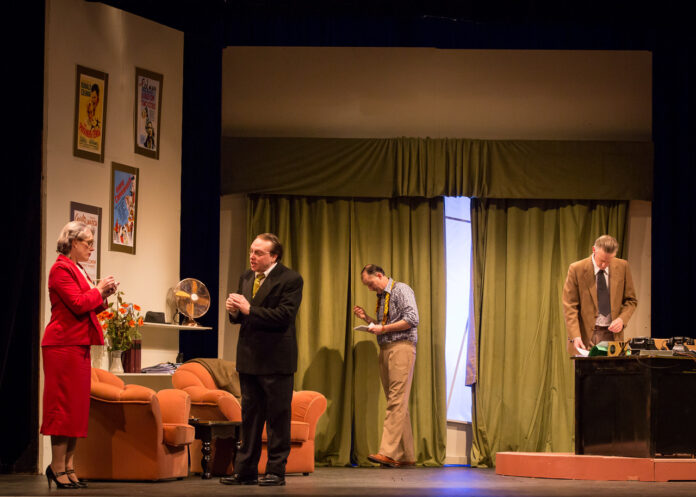Things are not going well for film producer David O Selznick ( played by Adam Shultz). He is desperate to continue with his prize project “Gone with the Wind”. A number of scriptwriters have been tried and fired. He has summarily dismissed his latest director and his long sought Scarlett O’Hara is getting itchy feet. What to do? He berates, bullies and bribes rapid fire writer Ben Hecht (Terry Crowe) to come up with a screen play even though that individual hasn’t read the book. He also hijacks director Scott Fleming (Scott Battersby) from his current project “The Wizard of Oz”. Fleming is rather relieved, because he was at that moment “up to his neck in Munchkins” and happy to be out of it. Both writer and film director display varied reluctance to come on board but the ever bombastic Selznick trumps all protestations. The play is all about what happens next within this interesting and entirely arresting premise.
Director for this stage play, Harry Dewar, is well up for it. Dewar has demonstrated his penchant for comedy in numerous productions. I have seen, and enjoyed, a couple of the recent pieces he has directed for the Noarlunga Theatre, particularly “Competitive Tenderness”, a delightful satirical commentary on the machinations of local government. Dewar has shown a keen sense for the ridiculous and that inclination is clear in the Rep’s production of “Moonlight and Magnolias”.
Dewar has been most astute in his casting for this parcel of craziness. Cooped up in Selznick’s office suite and driven by his frenetic insistence to get the task done the threesome commence their battle of words, ideas and egos! To the credit of the three actors the pace they generate rarely flags. At no stage did I discern a missed line or cue from either Schultz, Crowe or Battertsby. Mostly a change of pace was generated by the loyal and hapless Miss Poppenguhl (very aptly realised by Rebecca Gardiner). At Selznick’s constant command she enters the office to take a memo, remind him of a call or to deliver a seemingly endless supply of bananas and peanuts, Selznick’s nourishment of choice it would appear! When she comes into the office we get momentary respite from the quick fire repartee and ideas that, at times threaten to become an unstoppable torrent.
Given the action takes place in the 1930’s there are many references (particularly by Hecht) to the Jewish situation in pre-war Europe, the Jewish diaspora to the USA and, in particular, Eastern European Jewish influence within the burgeoning Hollywood movie industry. David O Selznick represents the power to be gained from success in this new and growing entertainment industry. He is likewise sensitive to its fragility and the slippery slope to obscurity if a project were to fail. He notes that “Movies don’t get made by men of ideas but by men of action!” There is constant reference to a popular and super successful “Test Pilot” also directed by Fleming and starring the big acting names of the day Clark Gable, Myrna Loy and Spencer Tracy. It appears to set a benchmark for them to reach for regardless of their individual likes and dislikes.
Schultz serves up a splendid performance as producer and impresario Selznick. His performance is very physical adding to his passionate emotions, and at times he makes use of the whole stage to strut his stuff. Even when he falls across his desk in sheer frustration and exhaustion his power remains palpable. Schultz’s delivery, diction and accent are faultless throughout.
Crowe’s (initially) tired, hungry and reluctant Ben Hecht is beautifully drawn. He portrays the highly sought ideas man and screen writer extraordinaire to great effect. The last scene in which both he and Selznick seek an apt line to conclude the play is great fun. It is Selznick who stumbles upon the “handle” they both seek when he inadvertently adds the adjective “frankly” to Rhett Butler’s famous parting phrase.
Battersby’s film director, Victor Fleming, is quite relieved to be extricated from one project and dubbed with another that would seem to promise much more. The strength of Battersby’s performance lies in the manner he adopts in order to placate the egos of the other two. Mostly he succeeds but there are inevitable clashes with the arrogantly irascible writer Hecht. Each of these three characters are onstage for pretty much all of the performance and their combined sustained efforts. Their endurance and their concentration are superb. I was most impressed.
The set by Skye McVicar is simple and utilitarian as are the lights by Richard Parkhill. The blood red sky that silhouettes Miss Poppenguhl posing in front of the office window whilst the theme music for “Gone with the Wind” is being contemplated by the exhausted trio is a visual highlight. The “slap” scene is a nicely rehearsed piece of schtick which really tickled the fancy of the audience. A well rehearsed. beautifully timed and flawless piece of theatre delivered by a talented team.



